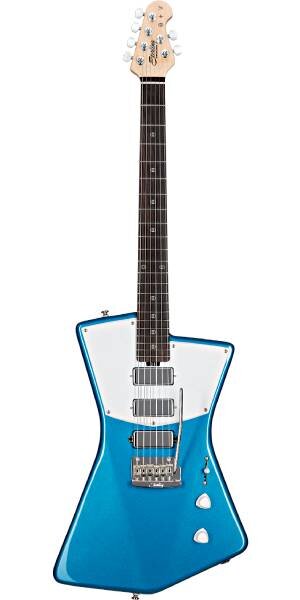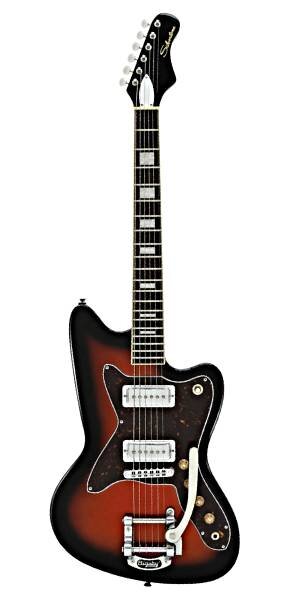
St. Vincent
One of the most unique and exciting acts of the 21st Century so far, St. Vincent has already proven that her music and ability as a performer will stand the test of time.
Image Credit: David Lee
How to get the Annie Clark (St. Vincent) Tone
Annie Clark (better known by her stage name St. Vincent) has an eclectic taste in guitars, which has helped achieve her iconic, often exploratory sounds. Her roster has included a 1955 Guild M-75 Aristocrat, a 1967 Harmony Bobcat and most recently Ernie Ball Music Man guitars, adding her own signature guitar to the line-up in 2016.
St. Vincent Signature Music Man
Annie Clark (St. Vincent) plays a St. Vincent Signature Music Man electric guitar, which she has used extensively since its release in 2016, featuring heavily in her live and studio work. Having previously used an Albert Lee Signature Music Man, Clark had experience with Ernie Ball guitars, but her own signature model shares little in common with those that came before it.
Designed entirely to her own specifications, the St. Vincent Signature Music Man features three Dimarzio mini humbuckers and a lightweight body made from Okoume, which allows the guitar to weigh just over 7lbs 5oz or 3.3kg (for reference, a standard Fender Stratocaster weighs about 8lbs/3.6kg and Les Pauls usually weigh between 9-12lbs/4-5.4kg).
The body design took inspiration from Clark’s Harmony Bobkat guitar, as well as artistic cues from 1970s Japanese design, Russian artist Kazimir Malevich and undoubtedly other sources as well. The outcome is a shape that looks similar to a Gibson Firebird, but with the bolt-on neck construction more commonly found on Fender-style instruments.
Keeping the weight of the guitar down as much as possible was an important consideration for Clark, as was making sure it was a comfortable to play in both standing and seated positions.
Specs
Model: St. Vincent Signature Music Man
Body: Okoume
Pickups: 3x Dimarzio Mini Humbuckers (also available in HH, dual humbucker configuration)
Fretboard: Rosewood or Eboy, 10 inch radius
Frets: 22
Electronics:
Notes: Includes custom tremolo
Alternatives
Sterling By Music Man St. Vincent
The Sterling By Music Man St. Vincent model is the official low-cost alternative to the artist’s signature guitar.
Fundamentally all of the core components that make the upmarket version distinct are still in-place, but while production of the pricier model is carried out in the USA, the Sterling is done in Indonesia.
Available from
St. Vincent Signature Music Man
A touch more refined than the “Sterling” version, this is the version created for and by St. Vincent, the end result of years spent refining her tone and experimenting with her gear.
This is the guitar that has garnered universal praise from guitarists the world over, not just St. Vincent fans, with many praising its look, feel, ergonomics and brilliant sound.
Available From
Epiphone Crestwood
While the Crestwood stylistically has little in common with the Music Man, it is one of few guitars available on the market today to feature mini humbuckers, and possibly the only one at this price point.
It also comes with a built-in tremolo system, which will come in handy when trying to replicate the sounds from some of Annie Clark’s songs.
Available From
1967 Harmony Silhouette/Bobkat H17
In the years before creating her signature guitar with Ernie Ball, St. Vincent extensively used a 1967 Harmony Silhouette H15, often called the “Bobkat”, although the guitars were not officially given the moniker Bobkat until 1968. The H17 model as used by Clark featured two pickups and a vibrato tailpiece.
These guitars were built in the USA in the ‘60s to compete with the popular solid body electric guitars being produced by Fender, and by all accounts the guitars are regarded on equal footing to their contemporaries, with some speculating the only reason these guitars aren’t as sought after as the equivalent vintage Fenders being that they never gained celebrity endorsement at the time.
As a result, Annie Clark’s use and public appreciation of the guitars has meant they have seen a surge in popularity in recent years, but prices remain far more affordable than the comparable Fenders of the time, meaning at present you can pick up a good quality, Made in USA 1960s solid body electric guitar for $1,000 or less, depending on condition.
The Harmony Silhouette/Bobkat was also sold as the Silvertone 1477, while some say “Barclay” or “Holiday” on the headstock, so if you’re in the market for one be sure to look at all of the variations to get the best deal.
Available from
Specs
Model: Harmony Silhouette/Bobkat H17
Body: Mahogany With a Maple Top
Neck: “Modern C” Profile
Pickups: 2 x DeArmond Gold Foil
Notes: Includes stock vibrola system
Affordable Alternatives
Harmony Silhouette
Though the original Harmony Silhouette and Bobkat models from the 1960s can still be found for a good price on the second hand market, that won’t always be the case.
Luckily, Harmony have recently re-introduced the Silhouette model, albeit in a more contemporary guise. There’s a lot to like about the new model as well, with custom gold foil mini humbuckers and a nitrocellulose finish, which is rare to see on a guitar at this price point.
Silvertone 1478
Interestingly, Harmony aren’t the only ones that have taken a stab at updating their classic offset design, with Silvertone offering this modern recreation of the 1478, also based on the Bobkat.
The 1478 was sold alongside the 1477 but featured block inlays and a vibrato tailpiece as standard.
In its modern form the Silvertone loses the gold foil DeArmond pickups, and instead uses P90 pickups, which offer a lot of the same tonal characteristics.
The Silvertone is also offered at a price that’s far more attractive to beginners, which the guitars were initially most popular with.
Annie Clark’s affinity with Ernie Ball doesn’t end with their Music Man range of guitars, the musician has also said that she uses Ernie Ball Slinky strings on her electric guitars.
As Well as using the "regular" .010 gauge strings, in a 2011 interview with Premier Guitar, she also mentions using .012 gauges:
"On “Year of the Tiger,” I actually do a super-metal tuning—down to a low F#, super sludgy and slimy—with .012-gauge strings and a .054 on the bottom."
Pedals make up an important part of St. Vincent’s tone, and it’s fair to say she’s been quite experimental with what she uses when it comes to cooking up new tones. As a result, her pedal board changes on a regular basis, and there aren’t too many mainstays from her early career on the board she uses today.
Eventide H9
In recent years, Clark has been known to use two Eventide H9 pedals while on stage. This is a multi-effects pedal that in addition to the pre-programmed effects also allows you to find more functions through the free app.
ZVex Mastotron
Fuzz pedals help create an important part of the St. Vincent sound, and while we don’t know exactly what pedal she currently prefers, this was her go-to pedal as of 2014.
Boss PS-6
Unlike many others, the Boss PS-5 Super Shifter makes regular appearances on Clark’s pedalboard. This pedal has recently been discontinued however, and replaced by the PS-6
Fender Princeton
In her earlier days as St. Vincent, Clark regularly paired her Harmony Bobkat with a Fender Princeton amp.
Throughout her career she has also been spotted using a Fender Deluxe Reverb, and TRVR Little Boy and TRVR Trinity models. TRVR amps are boutique-made, Fender-inspired amps, which offer much of the same kind of functionality you would expect from the Fenders they are based on, but offered at a higher level of build quality and craftsmanship.
There are no price guides on TRVR's website, but if you can find one on the secondhand market, they are usually priced higher than the respective Fender counterparts, as you might expect.
As her preference seems to lie with Fender-style amps, a Fender Princeton or Deluxe Reverb should fit the bill when trying to recreate her tones, or a Fender Mustang GT40 amp might suite those on a budget.









